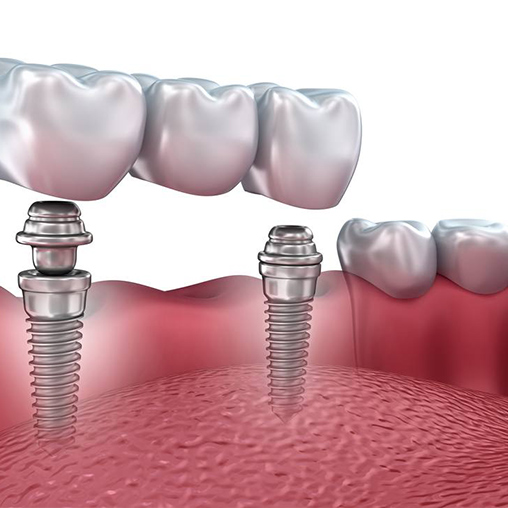Dental implants
Do you need a dental implant? If you are from Jalón or nearby municipalities such as Moraira,
Calpe, Benissa, or Teulada, visit our clinic and enjoy our treatment.
Dental implants are artificial titanium pieces that are placed into the bone and integrate with it due to their high biocompatibility.
Comfort for
a lifetime.
. . . .
At our clinic in Jalón, we perform dental implants that replace the root of the missing tooth, onto which a new tooth (crown) will subsequently be placed.
In many cases, it is not necessary to place an implant for each tooth; for example, the loss of three teeth can be replaced with just two implants using a bridge of three pieces.
They can also be used as a means of anchoring a denture for greater comfort for patients who do not wish to have a large number of implants due to cost or limited bone availability.
Sessions
1 session

ADVANTAGES OF DENTAL IMPLANTS
-
Bone maintenance, an implant is the best way to preserve the height and width of the bone as long as it remains in good condition.
-
There is no need to shape or reduce neighboring teeth, as the implant does not need to rely on adjacent teeth like bridges do.
-
They maintain the aesthetics of the smile, chewing function, and phonetics (no one will notice that you have implants, as being fixed prosthetics, they will feel like your own teeth).
Solve your doubts

Why do I need to replace parts?
-
Avoid unwanted movement of adjacent teeth and their overloading, as they have to bear the force of the missing teeth.
-
Prevent premature aging of the face due to loss of alveolar bone: thinning of the lips (especially the upper lip), accentuation of the nasolabial folds, appearance of a "double chin" or "witch's chin", etc.
What are immediate implants?
Immediate implants are an advanced technique in which the dentist extracts the defective teeth and places the implant(s) in the same socket left by the roots, thereby replacing the teeth in the same procedure, which shortens the treatment time, reduces the number of interventions, and significantly improves patient comfort. Thanks to immediate load implants, the patient can leave the same day with a provisional tooth while the tissues heal and the implant(s) are perfectly integrated into the bone.
No one will notice that you have implants, as being a fixed prosthesis, it will be as if you had your own teeth.
Is a dental implant painful?
The placement of a dental implant is performed under local anesthesia, so the patient does not feel any pain or discomfort. On the other hand, we are increasingly using less invasive techniques, such as the “flapless” technique, where stitches are not even required, but this will depend on your specific case.
SOLUTIONS AND ALTERNATIVES
Dental implants in patients
with little bone
1. Bone grafting
Sometimes, if the maxillary or mandibular area where the implant needs to be placed is too thin or soft, or if a lot of time has passed since the tooth was lost, the bone may have disappeared due to lack of function. In other cases, the infection that caused the tooth loss has resorbed part of the surrounding bone in the area where the implant should go, making its placement impossible.
In these cases, before placing the implant or during the same procedure (whenever possible), we need to perform a bone graft to enable the placement of the implant.
2. Breast Lift
When a patient does not have sufficient bone height to place an implant in the posterior maxilla due to the maxillary sinus, a technique called sinus lift is performed. This involves repositioning the sinus membrane to a higher position and placing a bone graft. Autologous bone (from the patient) is mixed with synthetic material and inserted into the molar and premolar area. The goal is to create space for bone regeneration and formation for future implant placement.
It is the oldest type of bone augmentation, very safe, with excellent results and a low complication rate. Additionally, it has been extensively studied in scientific articles with very high success rates.
3. Zygomatic implants
Zygomatic implants (or zygomatic) are considered one of the best options for replacing all upper teeth when there is insufficient maxillary bone.
Zygomatic implants are a type of dental implants that are placed directly into the zygomatic or malar bone, hence the name by which they are known.
These implants are used for patients with very little upper maxilla. Their goal is to achieve proper anchorage for prosthetics, which can be implant-supported or hybrid, and ensure a perfect fit. An implant-supported prosthesis is a denture that is supported by both the gums and implants.
The zygomatic bone is used as a strong bone capable of supporting the implants. This achieves the necessary stability and allows the implants to withstand the pressure generated during chewing for a long time.
Zygomatic implants allow individuals who would normally require large bone grafts and multiple surgeries to obtain their implants in a single procedure.
Furthermore, due to the bone resistance of the zygomatic bone, we can place fixed teeth on the same day as the implant surgery, a process known as immediate loading.
Address
Av. Joanot Martonell, 5
03727 Xaló, Alicante
Spain
Contact Information
966 48 07 60
655 686 977
info@clinicasbravo.com


